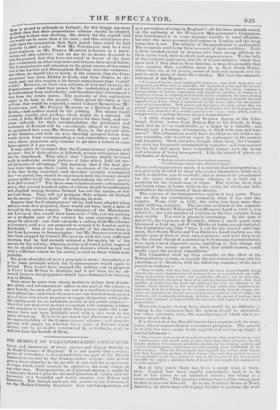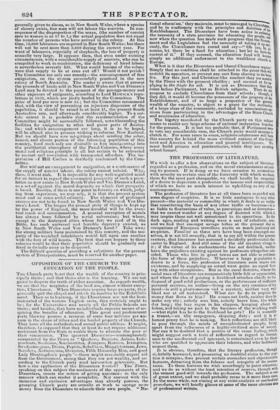THE SUBJECT OF TRANSPORTATION CONTINUED.
CRISIE and immorality of every species and degree flourish in the Penal Colonies of England. It is not merely that a certaio portion of wickedness is transferred from one part of the British dominions to another by .the Transportation system : that system gives a direct stimulus to the growth of vice and the perpetration of crime, whieh could scarcely be applied to the same extent in any other way. Transportation, as at present managed, might be
eunningly-devised plan for the multiplication of villany and the conversion of a beautiful and fertile country into Sedum and Gomorrah. But though such are the results in the Colonies, is tot the Mother Country benefited? dues not transportation act
as a preventive of crime in England ?—It has been already stated, on the authority of Sir WILLIAM MOLESWORTH'i Committee, that banishment is in some measure terrible to rural offenders, but that the more accomplished rogues in London and the large towns fear it not. The severity of the punishment is underrate The criminals send home false accounte of their condition. Exile is little threaded except by persons who have strong affection fot their native land, their kindred, and acquaintances. To the bulk of the criminal population, the life of honest industry which they must lead if they abstain from thieving, is more disagreeable than they imagine their condition must be in New South Wales, where they are, at all events, secure of food and raiment, and ex- pect to meet many of their old comrades. But hear the emphatic statement of the Report- ,' It is proved by the most irrefragable testimony, that both those who are prosperous and those who are miserable, the drawers of prizes and the drawers of blanks in this strange lottery, influenced perhaps by the desire common to human nature, of having companions and partakers, whether of misery or of happiness, concur in tempting their friends in this country by the most alluring descriptions to crone out and join them; thereby tending to diminish the Mae apprehension, if any, which is entertained hy the lower orders for the punish- ment of transportation. Both reason and experience, therefore, prove that the utmost ;Ipprehension which the generality of offenders feel for transportation, is little more than that they would experience for simple exile ; which, next te transportation, is perhaps the most unequal of punishments."
" A little wicked tailor," said SYDNhY SMITH in the Edin- burgh Review, writes from Botany Bay to his friends in Eng- land, that he is " as comfortable as a finger in a thimble ; and. though only a fraction of humanity, is filled with rum and kan- garoo." The information would have its effect on the tailor's for- mer comrades, who would be eager to participate in the comfort and kangaroo. Such accounts, though often false, the Commit- tee state are frequently transmitted by convicts ; and they account for the fact that many have committed crimes with the desire and intention of being transported. Like the crowd of ghosts on the banks of Acheron,
Stabant nrantes priori transmittere cursum, Tendebantque warms ripr ulterions amore."
Poetry and exaggeration apart, it is certain that transportation ie not generally dreaded by those who render themselves liable to it, and it is therefore safe to conclude, that to make it the punishment for the great majority of serious offences, is to hold out a premium for the commission of them. The system. then, does not lessen crime at home, while in the colony its effects are inde- scribable in the full extent of their atrocity. The expense of the transportation system is very great. There are no data for ascertaining accurately what it has cost thie country. From 1787 to 1837, the outlay has been more than eight millions, certainly. The account rendered of the expendi- ture for New South \Vales and Van Diemen's Land in 1836-7, was 488,013/.; the total number of convicts in the two colonies being then 60,000. The cost is annually increasing. In the sum of 488,0131., the expenses at Bermuda, where a small .penal esta- blishment is kept up, and of the Hulks at home, are not included. The Committee say, that " were it not for the convict estaldish- ment, New South Wales and Van Diemen's Land ought to rav the greater part at least of their own expenses ; and were they to do so, the annual charge of maintaining well-managed penitentiaries, even upon a most expensive scale, including in that charge the interest of the money spent in their first establishment, could hardly equal the present expenditure."
The Committee wind up their remarks on the effect of' the Transportation system, as regards the prevention of crime and the punishment of offenders, with the following summary of the facts proved in evidence-
" They consider that they have submitted the most unquestionable Immix that the two main characteristics of transportation, as a punishment, are ineffi- ciency in deterring frmn crime, and remarkable efficiency, not in reformieg, but in still further corrupting those who undergo the pouishment ; that these qualities of inefficiency for good and efficiency for evil, are inherent it, the system, which therefore is not susceptible of any satisfactory improvement; and lastly, that there belongs to the system, extrinsically from its strange cha- racter as a punishment, the yet more curious and monstions evil of calling intc existence and eontinu illy extending, societies, or the germs of nations, meet thoroughly depraved as respects both the character and degree of their vicioue propensities."
Were the inquiry to stop here, there would be no difficulty le. coming to the conclusion that the system should be abolished; but other questions arise, the consideration of which the Com- tnittee do not shit k.
It is known that the Penal Colonies have experienced, for many years, almost unprecedented economical prosperity. The growth. • in wealth has been owing to the regular and increasing supply of convict labourers-
" The convicts were assigned to settlers as slaves; they were furred to well in combination, and raised more produce than they could consume; for tine surplus produce Government provided a maiket, by maintaining military and convict establishments, which have cost this country alcove 7(X)0,000/. of the public money. Thus the Government first supplied the settlers with labour, and then bought the produce of that labour : the trade thus carried on waR a very profitable one for the settlers, as long aR the demand of the Governmem exceed(' the supply ; and this excess of demand over supply has continued up to a late period.'
But of late years there has been a great want of work- men. Capital has been rapidly augmented: land is to be had at low prices to an unlimited extent but labour is a scarce commodity. The peculiar circumstances of the colony have tended to increase this evil. As in the Southern States of North America, no white man will engage for hire to perform the work generally given to slaves, so in New South Wales,where a species of slavery exists, free men will not labour like convicts. In con- sequence of the disproportion of the sexes, (the number of convict men to women is as 17 to 1,) the actual population does not equal the number of persons who have arrived in the colony. At this time, 10,000 labourers are required in New South Wales; but there wall not be sent more than 3,000 during the current year. For want of labourers, especially of shepherds, the loss of property is annually very large. It appears then, that even under existing circumstances, with a considerable supply of convicts, who can be compelled to work in combination, the deficiency of hired labour is nevertheless severely felt. What would become of the colony were that supply to be at once cut off? Would it not perish ? The Committee see only one remedy—the encouragement of free emigration, on the system successfully practised in the new colony of South Australia. The reader is aware that at present the proceeds of lands sold in New South Wales and Van Diemen's Land may be devoted to the payment of the passage-money and other expenses of emigrants, according to Lord Howsex's regu- lations in 1831, which are justly lauded by the Committee. The price of land per acre is now 5s.; but the Committee recommend that, with the view of preventing an injurious dispersion of the population, it should be raised to at least 1/., the present South Australian rate, and afterwards considerably higher. To a cer- tain extent it is probable that the recommendation of the Committee might be successfully followed, notwithstanding the facilities for emigration to other and purer parts of Austra- lia; and which encouragement ere long, it is to be hoped, will be offered also to persons wishing to colonize New Zealand. But we should have sore misgivings about sending the sober, honest, and chaste portion of the labouring population of this country, (and such only are desirable as free immigrants,) into the pestilential atmosphere of the Penal Colonies, where every moral and religious principle is all but certain to be subverted by comae and association with transported offenders. The im- portation if Hill Coolies is decidedly condemned by the Com- mittee.
But will out enscuragement to emigration, or a continuance of the supply of convict labour, the colony cannot subsist. Why, then, it must sink. It is impossible for any well-regulated mind for an instant to regard the economical prosperity of such a popu- lation as now exists in New South Wales and Van Diemen's Land, as a setooll' against the moral depravity on svliieb that prosperity is based. Besides, if there is one point in futurity on which„judg- ing from experience, we may rely, it is that the present system must end in some awful calamity. The elements of prolonged success aie not to be found in New South Wales and Van Die- men's Land. The longer the present state of things is kept up by the power of England, the more dreadful will be the even- tual crash and consummation. A general corruption of morals Las alwass been followed by social subversion; but where, except in the destroyed cities whose fate we read of in the Inns such universal and horrible depravity existed, as in New South Wales and Van Diemen's Land ? Take away the strong military force maintained by this country, and the ma- jority of the wretched inhabitants would fall upon one another with the fury of wild beasts. The best that can happen to those colonies would be that their population should be gradually suf- fered to dwindle away or be dispersed. The difficult question of providing a substitute for the present system of Transportation, must be reserved for another paper.



























 Previous page
Previous page